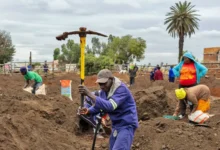
At least 82 people have been killed in a fire at a hospital treating coronavirus (COVID-19) patients in the capital of Iraq, Baghdad.
More than 100 others were injured in the blaze, which erupted at the Ibn Khatib hospital on Saturday night.
Reports say an accident had caused an oxygen tank to explode, sparking the blaze.
Videos on social media show firefighters scrambling to extinguish the flames as people flee the building.
Iraq’s Prime Minister Mustafa al-Kadhimi on Sunday suspended the health minister and ordered an investigation into the tragedy.
The head of Iraq’s Civil Defence, General Kadhim Bohan, said the fire had broken out in the hospital’s intensive-care unit, on a floor “designated for pulmonary resuscitation”.
About “30 patients were in the intensive care unit”, which was reserved for the most severe cases of COVID-19 in Baghdad, a hospital source told the AFP news agency.
The fire was under control by the early hours of Sunday morning, Iraq’s Civil Defence said.
In a statement, the government’s human rights commission said the incident was “a crime against patients exhausted by COVID-19”.
Emergency service officials said many patients died when they were taken off oxygen machines to be evacuated, while others were suffocated by smoke.
“Once the fire started somebody needed to put the auto central pipes off, which means basically cutting the oxygen from those who need it most,” Halla Sarraf, the director of Iraqi Health Access, a non-governmental organisation, told the BBC.
Iraq’s hospitals have been pushed to the limit during the coronavirus pandemic, adding to the strains wrought by years of war, neglect and corruption.
Covid infections have been rising steeply since February in Iraq, and the total passed the one-million mark this week.
The health ministry has recorded 1,025,288 cases and 15,217 deaths since the pandemic began.
The country launched its vaccination campaign last month, and has received nearly 650,000 doses, most of which have come from Covax, a global programme for sharing jabs. –AFP/BBC







